On January 25, 2011, tens of thousands of Egyptians took to the streets for unprecedented protests against the three-decade dictatorship of President Hosni Mubarak, stunning the government, the country, and the wider region. In the ensuing 18 days, the protests grew into a national popular uprising centered in Cairo’s Tahrir Square, demanding Mubarak’s ouster and “bread, freedom, and social justice.” On February 11, 2011, Mubarak resigned and the Egyptian military assumed power, promising to oversee a democratic transition. The January 25 Revolution brought widespread elation in Egypt and helped inspire the 2011 pro-democracy uprisings against regimes in Libya, Bahrain, Yemen, Syria, and elsewhere.
What followed in Egypt was a tumultuous two and a half years of political and social ferment and partial democratization—brought to an end by the July 3, 2013 military coup led by now-President Abdel Fattah al-Sisi. In the years since, al-Sisi has reimposed a military-backed dictatorship and led the most repressive period in Egypt’s modern history. Yet some observers believe his regime is far from stable and that aftershocks from the political earthquake of January 25, 2011, will reverberate for years to come.
Please join us for a special event, “Ten Years Since Tahrir Square: Egypt Then and Now,” with an outstanding group of Egypt experts. With a decade of hindsight, what can we see more clearly about the Uprising? Why did the attempted democratic transition fail? What are the lasting effects of January 25 on politics and society? How does al-Sisi’s regime differ from Mubarak’s? What are the main sources of instability in Egypt today, and what might a future popular uprising look like?
Panel 1: Looking Back at 2011
10:00 – 11:00 AM
Panelists:
- Abdelrahman Ayyash
Freelance Journalist and Researcher - Sahar Aziz
Professor of Law, Middle East and Legal Studies Scholar,
Rutgers University Law School - Michael Hanna
Senior Fellow, The Century Foundation - Salma El Hosseiny
Program Manager, Human Rights Council,
International Service for Human Rights
Moderator:
- Stephen McInerney
Executive Director,
Project on Middle East Democracy
Panel 2: Looking at Egypt Today
11:00 AM – 12:00 PM
Panelists:
- Michele Dunne
Director and Senior Fellow, Middle East Program,
Carnegie Endowment for International Peace - Ezzedine C. Fishere
Novelist and Senior Lecturer at Dartmouth College - Nancy Okail
Scholar, Human Rights and Democracy Advocate - Robert Springborg
Professor of National Security Affairs (ret), Naval Postgraduate School
Moderator:
- Amy Hawthorne (moderator)
Deputy Director for Research, POMED
Speaker Bios:
Panel 1: Looking Back at 2011
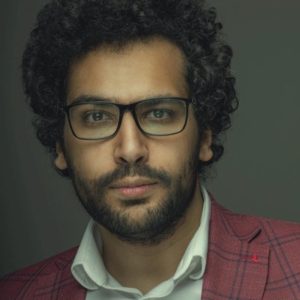 Abdelrahman Ayyash is an Egyptian researcher, translator, and journalist based in Washington, DC. He holds a master’s in global affairs from Bahçeşehir University in Istanbul, Turkey. His research focuses on Islamic movements in the Middle East, human rights, and civilian-military relations. He is the author of a recent report for the Century Foundation ittled “The Turkish Future of Egypt’s Muslim Brotherhood.”
Abdelrahman Ayyash is an Egyptian researcher, translator, and journalist based in Washington, DC. He holds a master’s in global affairs from Bahçeşehir University in Istanbul, Turkey. His research focuses on Islamic movements in the Middle East, human rights, and civilian-military relations. He is the author of a recent report for the Century Foundation ittled “The Turkish Future of Egypt’s Muslim Brotherhood.”
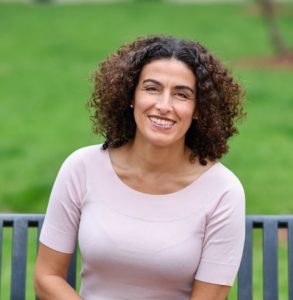 Sahar Aziz is Professor of Law, Chancellor’s Social Justice Scholar, and Middle East and Legal Studies Scholar at Rutgers University Law School. Her research investigates the relationship between authoritarianism, terrorism, and rule of law in Egypt and elsewhere. She is the founding director of the interdisciplinary Rutgers Center for Security, Race, and Rights. Professor Aziz is an editor for the Arab Law Quarterly and the International Journal of Middle East Studies. Her forthcoming book The Racial Muslim: When Racism Quashes Religious Freedom (2021) examines how religious bigotry racializes immigrant Muslims through a historical and comparative approach.
Sahar Aziz is Professor of Law, Chancellor’s Social Justice Scholar, and Middle East and Legal Studies Scholar at Rutgers University Law School. Her research investigates the relationship between authoritarianism, terrorism, and rule of law in Egypt and elsewhere. She is the founding director of the interdisciplinary Rutgers Center for Security, Race, and Rights. Professor Aziz is an editor for the Arab Law Quarterly and the International Journal of Middle East Studies. Her forthcoming book The Racial Muslim: When Racism Quashes Religious Freedom (2021) examines how religious bigotry racializes immigrant Muslims through a historical and comparative approach.
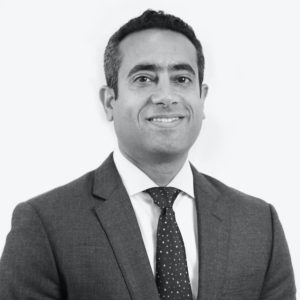 Michael Wahid Hanna is a senior fellow at The Century Foundation. He is also a non-resident senior fellow at the Reiss Center on Law and Security at New York University School of Law. Hanna works on issues of international security, international law, and U.S. foreign policy in the Middle East and South Asia and is a prominent expert on Egypt. He is the co-author of numerous publications on Egypt and of several Century Foundation studies, including Hybrid Actors: Armed Groups and State Fragmentation in the Middle East (2019) and Citizenship and Its Discontents: The Struggle for Rights, Pluralism, and Inclusion in the Middle East (2019). He served as a consultant for Human Rights Watch in Baghdad in 2008. Prior to joining The Century Foundation, Hanna was a senior fellow at the International Human Rights Law Institute. Fluent in Arabic, he was a Fulbright Scholar at Cairo University. He received a JD from New York University School of Law, where he was an editor of the Law Review.
Michael Wahid Hanna is a senior fellow at The Century Foundation. He is also a non-resident senior fellow at the Reiss Center on Law and Security at New York University School of Law. Hanna works on issues of international security, international law, and U.S. foreign policy in the Middle East and South Asia and is a prominent expert on Egypt. He is the co-author of numerous publications on Egypt and of several Century Foundation studies, including Hybrid Actors: Armed Groups and State Fragmentation in the Middle East (2019) and Citizenship and Its Discontents: The Struggle for Rights, Pluralism, and Inclusion in the Middle East (2019). He served as a consultant for Human Rights Watch in Baghdad in 2008. Prior to joining The Century Foundation, Hanna was a senior fellow at the International Human Rights Law Institute. Fluent in Arabic, he was a Fulbright Scholar at Cairo University. He received a JD from New York University School of Law, where he was an editor of the Law Review.

Salma El Hosseiny is a program manager at the International Service for Human Rights (ISHR), where she leads strategic engagement and advocacy at the Human Rights Council. She holds a master’s degree in International Human Rights Law and a Bachelor’s degree in Political Science from the American University in Cairo. Prior to joining ISHR, Salma worked for international and national human rights organisations in the Middle East and North Africa region. Her work focused on the protection of human rights defenders, civil and political rights and women’s rights.
 Stephen McInerney (moderator) is the executive director of the Project on Middle East Democracy (POMED). Prior to joining POMED in 2007, he had spent six years living, working, and studying in the Middle East and North Africa—two years each in Egypt, Lebanon, and Qatar. He spent two years in a master’s degree program in the Center for Arab and Middle Eastern Studies at the American University of Beirut, one year on a fellowship at the Center for Arab Study Abroad (CASA) at the American University in Cairo, and three years teaching at Cairo American College and the American School of Doha. He received a Master’s degree from Stanford University and is fluent in Arabic.
Stephen McInerney (moderator) is the executive director of the Project on Middle East Democracy (POMED). Prior to joining POMED in 2007, he had spent six years living, working, and studying in the Middle East and North Africa—two years each in Egypt, Lebanon, and Qatar. He spent two years in a master’s degree program in the Center for Arab and Middle Eastern Studies at the American University of Beirut, one year on a fellowship at the Center for Arab Study Abroad (CASA) at the American University in Cairo, and three years teaching at Cairo American College and the American School of Doha. He received a Master’s degree from Stanford University and is fluent in Arabic.
Panel 2: Looking at Egypt Today
 Michele Dunne is the director of and a senior fellow in Carnegie’s Middle East Program, where her research focuses on political and economic change in Arab countries, particularly Egypt, as well as U.S. policy in the Middle East. She was the founding director of the Rafik Hariri Center for the Middle East at the Atlantic Council from 2011 to 2013 and was a senior associate and editor of the Arab Reform Bulletin at the Carnegie Endowment for International Peace from 2006 to 2011. Dunne was a Middle East specialist at the U.S. Department of State from 1986 to 2003, where she served in assignments that included the National Security Council, the Secretary’s Policy Planning Staff, the U.S. embassy in Cairo, the U.S. consulate general in Jerusalem, and the Bureau of Intelligence and Research. She also served as a visiting professor of Arabic language and Arab studies at Georgetown from 2003 to 2006.
Michele Dunne is the director of and a senior fellow in Carnegie’s Middle East Program, where her research focuses on political and economic change in Arab countries, particularly Egypt, as well as U.S. policy in the Middle East. She was the founding director of the Rafik Hariri Center for the Middle East at the Atlantic Council from 2011 to 2013 and was a senior associate and editor of the Arab Reform Bulletin at the Carnegie Endowment for International Peace from 2006 to 2011. Dunne was a Middle East specialist at the U.S. Department of State from 1986 to 2003, where she served in assignments that included the National Security Council, the Secretary’s Policy Planning Staff, the U.S. embassy in Cairo, the U.S. consulate general in Jerusalem, and the Bureau of Intelligence and Research. She also served as a visiting professor of Arabic language and Arab studies at Georgetown from 2003 to 2006.
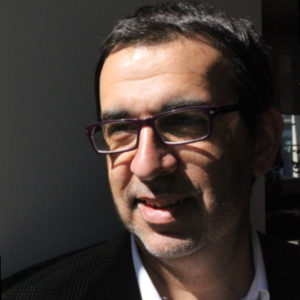 Ezzedine C. Fishere is a senior lecturer at Dartmouth College, where he has taught courses on Middle East politics and culture since 2016. Fishere was the Washington Post’s second Jamal Khashoggi fellow and contributes regular commentary on Egypt and the broader region to the paper’s Global Opinions section. He previously taught in the Political Science department of the American University in Cairo. Fishere previously served as an advisor to pro-democracy movements and political candidates including Mohamed Elbaradei, from 2011 to 2013, and Hamdeen Sabahi, in 2014. He worked for the Egyptian Foreign Service and United Nations missions in the Middle East. He directed the Arab-Israeli project at the International Crisis Group from 2007 to 2008, and worked as a counselor to the Egyptian foreign minister from 2005 to 2007. He has also served as a political adviser at the United Nations Missions in Sudan and the United Nations Special Coordinator for the Middle East Peace Process (UNSCO) in Jerusalem. Fishere has published seven novels in Arabic, two of which were translated into English—including, most recently, The Egyptian Assassin: A Novel (2019).
Ezzedine C. Fishere is a senior lecturer at Dartmouth College, where he has taught courses on Middle East politics and culture since 2016. Fishere was the Washington Post’s second Jamal Khashoggi fellow and contributes regular commentary on Egypt and the broader region to the paper’s Global Opinions section. He previously taught in the Political Science department of the American University in Cairo. Fishere previously served as an advisor to pro-democracy movements and political candidates including Mohamed Elbaradei, from 2011 to 2013, and Hamdeen Sabahi, in 2014. He worked for the Egyptian Foreign Service and United Nations missions in the Middle East. He directed the Arab-Israeli project at the International Crisis Group from 2007 to 2008, and worked as a counselor to the Egyptian foreign minister from 2005 to 2007. He has also served as a political adviser at the United Nations Missions in Sudan and the United Nations Special Coordinator for the Middle East Peace Process (UNSCO) in Jerusalem. Fishere has published seven novels in Arabic, two of which were translated into English—including, most recently, The Egyptian Assassin: A Novel (2019).
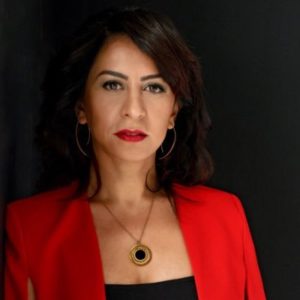
Nancy Okail is the President of 4AChange, a newly founded organization focusing on accountability on the global level. Okail started 4AChange during her appointment in 2020 as a visiting scholar at the Center for Development, Democracy, and the Rule of Law at Stanford University. Okail has over 20 years of experience working on issues of democracy, rule of law, human rights, governance, and security in the Middle East and North Africa region with recognized expertise on Egypt. She previously served as the executive director of the Tahrir Institute for Middle East Policy (TIMEP) from its foundation in 2013 until 2019. Okail also previously served as the director of Freedom House’s Egypt program. She has also worked with the Egyptian government as a senior evaluation officer of foreign aid and managed programs for several international organizations. Okail was one of the 43 nongovernmental organization workers convicted and sentenced to prison in a widely publicized 2012 case for allegedly using foreign funds to foment unrest in Egypt. She holds a Ph.D. from the University of Sussex in the UK; her doctoral research focused on the power relations of foreign aid.
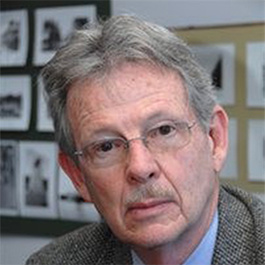 Robert Springborg is one of the world’s most prominent experts on Egypt. He is an adjunct professor of International Studies at Simon Fraser University and a non-resident research fellow of the Italian Institute of International Affairs. Until October 2013, he was Professor of National Security Affairs at the Naval Postgraduate School and Program Manager for the Middle East for the Center for Civil-Military Relations. He is the author of numerous books on Egypt, including Political Economies of the Middle East and North Africa (Polity Press, 2020), Egypt (Polity Press, 2018), Family, Power and Politics in Egypt (University of Pennsylvania Press, 1982), Mubarak’s Egypt: Fragmentation of the Political Order (Westview, 1989), and several other works on Middle Eastern politics and economies. His next book is The Political Economy of Education in the Arab World (Lynne Rienner, 2021), which he edited alongside Hicham Alaoui and which comes out in March of this year. He has worked as a consultant on Middle East governance and politics for USAID, the U.S. State Department, the UNDP, and various UK government departments.
Robert Springborg is one of the world’s most prominent experts on Egypt. He is an adjunct professor of International Studies at Simon Fraser University and a non-resident research fellow of the Italian Institute of International Affairs. Until October 2013, he was Professor of National Security Affairs at the Naval Postgraduate School and Program Manager for the Middle East for the Center for Civil-Military Relations. He is the author of numerous books on Egypt, including Political Economies of the Middle East and North Africa (Polity Press, 2020), Egypt (Polity Press, 2018), Family, Power and Politics in Egypt (University of Pennsylvania Press, 1982), Mubarak’s Egypt: Fragmentation of the Political Order (Westview, 1989), and several other works on Middle Eastern politics and economies. His next book is The Political Economy of Education in the Arab World (Lynne Rienner, 2021), which he edited alongside Hicham Alaoui and which comes out in March of this year. He has worked as a consultant on Middle East governance and politics for USAID, the U.S. State Department, the UNDP, and various UK government departments.
 Amy Hawthorne (moderator) is POMED’s Deputy Director for Research and an expert on Middle East politics and U.S. policy. Before joining POMED five years ago, Ms. Hawthorne was a senior fellow at the Atlantic Council’s Rafik Hariri Center for the Middle East and Egypt Coordinator at the Department of State during the Arab Uprisings. Her previous positions include executive director of the Hollings Center for International Dialogue, fellow at the Carnegie Endowment for International Peace, and senior program officer for the Middle East at the International Foundation for Electoral Systems. Amy studied at Yale University and the University of Michigan and has lived and traveled extensively in the Arab world and Turkey.
Amy Hawthorne (moderator) is POMED’s Deputy Director for Research and an expert on Middle East politics and U.S. policy. Before joining POMED five years ago, Ms. Hawthorne was a senior fellow at the Atlantic Council’s Rafik Hariri Center for the Middle East and Egypt Coordinator at the Department of State during the Arab Uprisings. Her previous positions include executive director of the Hollings Center for International Dialogue, fellow at the Carnegie Endowment for International Peace, and senior program officer for the Middle East at the International Foundation for Electoral Systems. Amy studied at Yale University and the University of Michigan and has lived and traveled extensively in the Arab world and Turkey.

